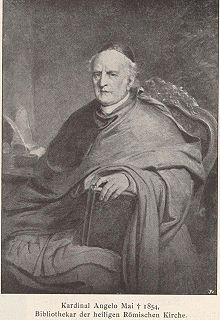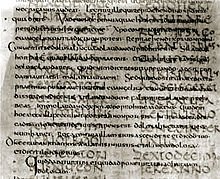Angelo May
Angelo Mai (born March 7, 1782 in Schilpario , Bergamo province , Lombardy , † September 8, 1854 in Castel Gandolfo ) was an Italian curia cardinal and philologist .
Life
After the closure of the episcopal seminary in Bergamo, where he had studied rhetoric, in 1797 due to the French invasion , he continued his training at the College in Colorno, which was run by Jesuits even after the Jesuit order was dissolved , and then became a teacher of classical philology at in 1804 College of the Jesuits in Naples , where they were supported by Archduchess Maria Karolina of Austria . On November 24th, he informed his mother in a letter that he had been accepted into the order that still existed there on November 20th. After completing his education at the Collegium Romanum , he lived for some time as a teacher in Orvieto , where he dealt with paleographic studies. The political events of 1808 forced him to withdraw to Milan from Rome , where he had since returned . There he was appointed curator of the Biblioteca Ambrosiana in 1813 .
With his own energy and enthusiasm he now turned to the study of the numerous manuscripts entrusted to him and, over the next six years, was able to restore to the world a considerable number of long-lost works. After resigning from the Societas Jesu , which had been admitted again in 1814 , he was called to Rome in 1819 as Prefect of the Bibliotheca Apostolica Vaticana . In 1833 he was transferred to the secretariat of the Congregatio de propaganda fide and on February 2, 1838 he was elevated to cardinal with the titular church of Sant'Anastasia . Angelo Mai participated in the conclave of 1846 , which Pius IX. elected to the Pope. From 1851 to 1853, Cardinal Mai held the office of Prefect of the Council Congregation .
He died in Castel Gandolfo and was buried in his titular church, Sant'Anastasia .
Services
Angelo Mai's fame is largely based on his skills as a decipherer of palimpsests .
From his time in Milan:
- Fragments of Cicero's Pro Scauro , Pro Tullio , Pro Flacco , In Clodium et Curionem , De aere alieno Milonis , De rege Alexandrino , 1814;
- M. Corn. Frontonis opera inedita, cum epistolis item ineditis , Antonini Pii , Marci Aurelii , Lucii Veri et Appiani , 1815; New edition in 1823 with over 100 other letters from a manuscript in the Vatican Library;
- Parts of eight speeches by Quintus Aurelius Symmachus ;
- Fragments of Plautus ;
- Isaios ' speech on the legacy of Cleonymus ;
- the last nine books of the history of Dionysius of Halicarnassus and a number of other works.
From the time in Rome:
- M Tullii Ciceronis de republica quae supersunt and thus an important part of Cicero's theory of the state , which was believed to be lost , discovered in 1819
- Fragmenta quae dicuntur Vaticana , discovered in 1820
- Scriptorum veterum nova collectio, e Vaticanis codicibus edita , 1825-1838
- Classici scriptores e Vaticanis codicibus editi , 1828–1838
- Spicilegium Romanum , 1839-1844
- Patrum nova bibliotheca , 1845–1853.
His edition of the NT Codex Cittá del Vaticano, BAV, gr. 1209 , next to the Codex Sinaiticus, the most important manuscript of the New Testament , was completed in 1838, but was not published until 1858 - four years after his death, allegedly due to inaccuracies . It is considered to be the least satisfactory of his work and was superseded by the edition of Vercellone and Cozza in 1868, which itself left a lot to be desired.
Angelo Mai was not so successful as a text critic , but above all as a decipherer of difficult to read manuscripts. He was a persistent and persistent pioneer of manuscript and palimpsest research, through whose efforts many ancient texts that were believed to be lost could be recovered and others could be edited in improved text form due to the development of important manuscripts.
After the discovery of the De re publica Cicero, the Italian poet Giacomo Leopardi dedicated a canzone to him .
literature
- Benedetto Prina: Biografia del cardinale Angelo Mai. Gaffuri e Gatti, Bergamo 1882.
- Giuseppe Cozza-Luzi (Ed.): Epistolario del cardinale Angelo Mai. Primo saggio di cento lettere inedite. Bolis, Bergamo 1883.
- Gianni Gervasoni: Angelo Mai. Edizioni Orobiche, Bergamo 1954.
- Georgios Fatouros : May, Angelo. In: Biographisch-Bibliographisches Kirchenlexikon (BBKL). Volume 5, Bautz, Herzberg 1993, ISBN 3-88309-043-3 , Sp. 560-562.
- Antonio Carrannante: May, Angelo. In: Mario Caravale (ed.): Dizionario Biografico degli Italiani (DBI). Volume 67: Macchi – Malaspina. Istituto della Enciclopedia Italiana, Rome 2006.
Web links
- May, Angelo. In: Salvador Miranda : The Cardinals of the Holy Roman Church. ( Florida International University website), accessed January 23, 2017.
- Entry for Angelo Mai on catholic-hierarchy.org ; accessed on January 23, 2017.
- Publications by and about Angelo Mai in the Opac der Regesta Imperii
| personal data | |
|---|---|
| SURNAME | May, Angelo |
| BRIEF DESCRIPTION | Italian cardinal and philologist |
| DATE OF BIRTH | March 7, 1782 |
| PLACE OF BIRTH | Schilpario , Bergamo Province, Lombardy |
| DATE OF DEATH | September 8, 1854 |
| Place of death | Castel Gandolfo |


